Just as Ringo Starr had temporarily quit The Beatles in August 1968, George Harrison walked out on this day, unable to tolerate any longer the tensions within the group.
The Beatles were at Twickenham Film Studios, where their rehearsals were being captured on camera. The day began with a visit from Beatles music publisher Dick James, who spoke to Paul McCartney and Ringo Starr about Northern Songs’ recent purchase of the Lawrence Wright Music catalogue.
McCartney then played several songs to James on piano, including ‘The Long And Winding Road’, ‘Let It Be’, ‘Maxwell’s Silver Hammer’, ‘Don’t Let Me Down’, and ‘I’ve Got A Feeling’.
The Beatles worked hard on ‘Get Back’ during the morning. McCartney still hadn’t finalised the lyrics, but Tucson, Arizona was emerging as a setting. For one run-through John Lennon took the lead vocals.
Following several attempts at working ‘Get Back’ into shape, The Beatles moved onto ‘Two Of Us’. After breaking for lunch, however, George Harrison walked out of the studio.
At Twickenham, The Beatles, Yoko, and I, often joined by our cameraman Tony Richmond, would have a proper lunch in the small dining room up a flight of stairs, adjoining a bar where some crew members and studio office workers would be sinking their couple of pints of beer before going off to their own lunch…George was usually with us, joining in the conversation, affable and friendly and interested in the give-and-take, but on the day of the Tunisian discussion, he wasn’t with us as the meal started. At the morning rehearsal, I could tell by his silence and withdrawal that something was simmering inside him, and so in my role as documentarian, I’d asked our soundman to bug the flower pot on the lunch table.
We’d finished the first course when George arrived to stand at the end of the table.
We looked at him as he stood silent for a moment.
“See you ’round the clubs,” he said.
That was his good-bye. He left.
John, a person who reacted aggressively to provocation, immediately said, “Let’s get in Eric [Clapton]. He’s just as good and not such a headache.”
Paul and Ringo would not be drawn in, and after lunch we went back to the studio where Paul, John, and Ringo improvised a ferocious riff, half an hour of anger and frustration expressed with guitars and drums. Yoko sat on the edge of the rostrum on the blue cushion which had been George’s and howled into his mike.
(My bug had only picked up the sounds of cutlery banging on china plates, obscuring what the muffled voices had said.)
Luck And Circumstance
Harrison later recounted the incident for the Anthology project.
They were filming us having a row. It never came to blows, but I thought, ‘What’s the point of this? I’m quite capable of being relatively happy on my own and I’m not able to be happy in this situation. I’m getting out of here.’Everybody had gone through that. Ringo had left at one point. I know John wanted out. It was a very, very difficult, stressful time, and being filmed having a row as well was terrible. I got up and I thought, ‘I’m not doing this any more. I’m out of here.’ So I got my guitar and went home and that afternoon wrote ‘Wah-Wah’.
It became stifling, so that although this new album was supposed to break away from that type of recording (we were going back to playing live) it was still very much that kind of situation where he already had in his mind what he wanted. Paul wanted nobody to play on his songs until he decided how it should go. For me it was like: ‘What am I doing here? This is painful!’
Then superimposed on top of that was Yoko, and there were negative vibes at that time. John and Yoko were out on a limb. I don’t think he wanted much to be hanging out with us, and I think Yoko was pushing him out of the band, inasmuch as she didn’t want him hanging out with us.
It’s important to state that a lot of water has gone under the bridge and that, as we talk now, everybody’s good friends and we have a better understanding of the past. But talking about what was happening at that time, you can see it was strange.
Anthology
Whether in denial or disbelief, the remaining three Beatles carried on rehearsing without Harrison. Just as they’d worked on ‘Back In The USSR’ and ‘Dear Prudence’ without Starr, here John Lennon led the others through The Who’s ‘A Quick One, While He’s Away’ – the title a clear reference to Harrison. At one point he was heard to sarcastically call out “OK George, take it!”
George left because Paul and he were having a heated discussion. They weren’t getting on that day and George decided to leave, but he didn’t tell John or me or Paul. There’d been some tension going down in the morning, and arguments would go on anyway, so none of us realised until we went to lunch that George had gone home. When we came back he still wasn’t there, so we started jamming violently. Paul was playing his bass into the amp and John was off, and I was playing some weird drumming that I hadn’t done before. I don’t play like that as a rule. Our reaction was really, really interesting at the time. And Yoko jumped in, of course; she was there.
Anthology
Yoko Ono positioned herself on Harrison’s blue cushion, and wailed over the top of a series of barely-listenable, blues-based jams. The three Beatles joined together in the harshness of the music, possibly finding it cathartic amid the uncertainty of the day.
The aggressive tone carried through to the proper work, when it continued. The group performed jagged versions of ‘I’ve Got A Feeling’ and ‘Don’t Let Me Down’, with Lennon screaming during parts of the latter. He also sang ‘Maxwell’s Silver Hammer’ in an exaggerated German accent.
After some half-hearted runs through cover versions The Beatles largely stopped work to discuss the future of the Get Back project with the crew, although McCartney returned to his piano. As he did, Yoko Ono began wailing to his accompaniment, seemingly oblivious to the tensions in the room.
The Nagra reel-to-reel tapes that were recording audio for the cameras captured Lennon in conversation with director Michael Lindsay-Hogg. Lennon at one point suggested replacing Harrison with Eric Clapton if he didn’t return within a few days.
A series of jams took place towards the end of the day, again with Ono moaning or screaming largely wordless vocals. Finally, McCartney moved to drums, Lennon played guitar and Starr took the microphone for some improvised spoken lines, words which summed up their aimless desperation at this time.
Yeah, rock it to me baby! That’s what I like. You may think this is a full orchestra, but if you look closely you can see there’s only two people playing and one person singing. I know it sounds like Benny Goodman, but don’t worry, it’s the big sound of 1969! You bet your life! Oh, sock it to me, sock it to me!
Performances of ‘The Long And Winding Road’, ‘Get Back’, ‘Hi Heel Sneakers’, ‘Two Of Us’, ‘I’ve Got A Feeling’, ‘Don’t Let Me Down’, ‘Jam’ (ft Yoko Ono), ‘Maxwell’s Silver Hammer’, and ‘Martha My Dear’ from this day appeared in part one of the 2021 documentary Get Back.
The songs performed on this day:
- ‘The Long And Winding Road’ (three versions)
- ‘Let It Be’
- ‘Don’t Let Me Down’ (two versions)
- ‘Maxwell’s Silver Hammer’ (four versions)
- ‘I’ve Got A Feeling’ (four versions)
- ‘Get Back’ (22 versions)
- ‘She’s A Woman’
- ‘Hi Heel Sneakers’ (Tommy Tucker; two versions)
- ‘Long Tall Sally’
- ‘Theme from The Beatles Cartoons’
- ‘Catch A Falling Star’ (Perry Como)
- ‘Two Of Us’ (six versions)
- ‘I’m Talking About You’ (Chuck Berry)
- ‘A Quick One, While He’s Away’ (The Who; four versions)
- ‘Jam’ (Lennon-McCartney-Starkey-Ono)
- ‘Till There Was You’
- ‘C’mon Everybody’ (Eddie Cochran)
- ‘Mack The Knife’ (Bobby Darin)
- ‘Don’t Be Cruel’ (Elvis Presley)
- ‘The Peanut Vendor’ (Louis Armstrong)
- ‘It’s Only Make Believe’ (Conway Twitty)
- ‘Adagio for Strings’ (Samuel Barber)
- ‘Martha My Dear’
- ‘Sun King’
- ‘Dear Prudence’
- ‘On A Sunny Island’*
- ‘Through A London Window’
* presumed title.
View the complete list of songs played during the January 1969 Get Back/Let It Be sessions.
Also on this day...
- 2012: US publishing rights for six early Beatles songs are sold
- 2011: Gretsch to sell limited edition replica of George Harrison’s Duo Jet guitar
- 1972: UK album release: The Concert For Bangladesh by George Harrison & Friends
- 1968: Recording: Wonderwall Music by George Harrison
- 1967: Recording: Penny Lane
- 1966: US single release: Woman by Peter And Gordon
- 1964: Live: The Beatles’ Christmas Show
- 1964: US album release: Introducing The Beatles
- 1963: The Beatles live: Grafton Rooms, Liverpool
- 1962: The Beatles live: Cavern Club, Liverpool (evening)
- 1958: The Quarrymen live: New Clubmoor Hall, Liverpool
Want more? Visit the Beatles history section.



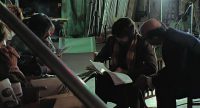

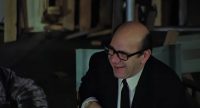
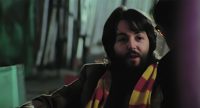
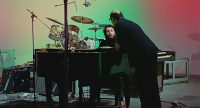
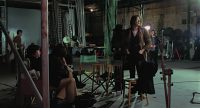
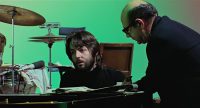
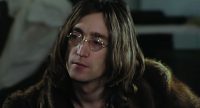
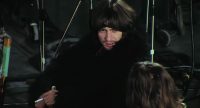

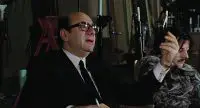
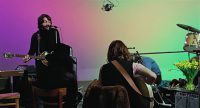
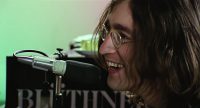
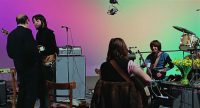
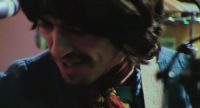
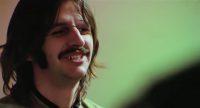
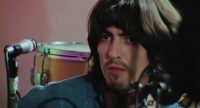
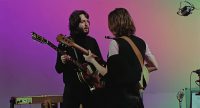
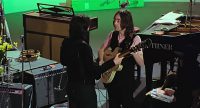
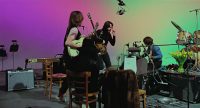
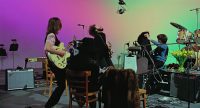
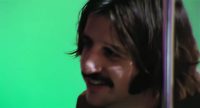
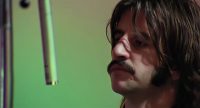
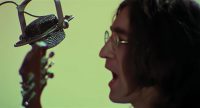
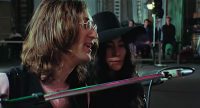
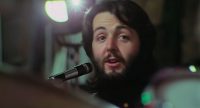
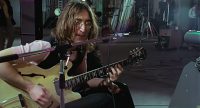
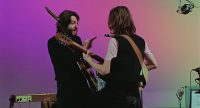
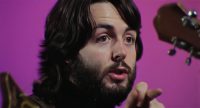
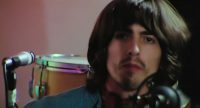
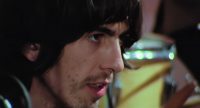
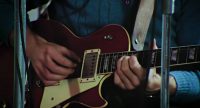
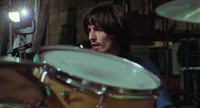

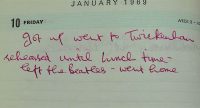
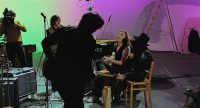
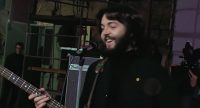
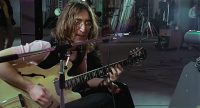

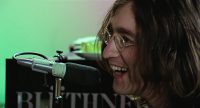
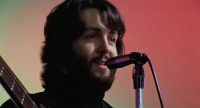
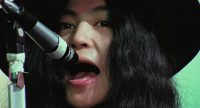
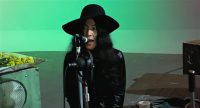
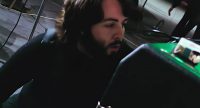
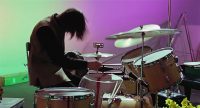

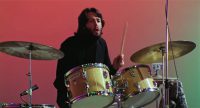
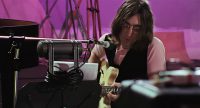

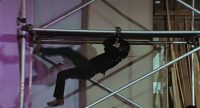
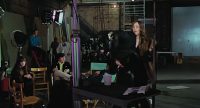
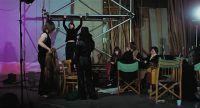
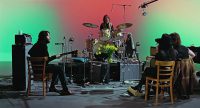
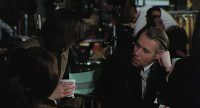
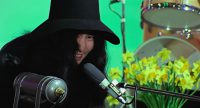
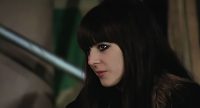
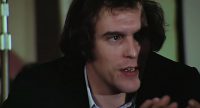
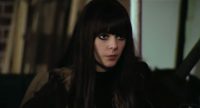
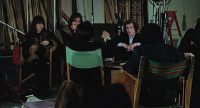
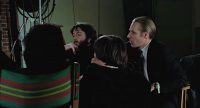
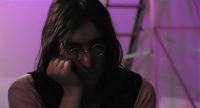
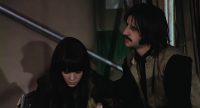
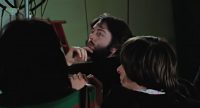
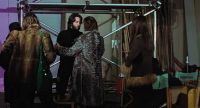
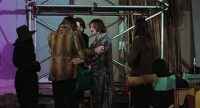
On the Nagra reels you can hear someone, presumably John, start a riff on guitar then George say “I’m leaving the band now.” John says “When?” and George repeats “Now.” It’s a big muffled what he says next but it’s along the lines of asking about his guitar case and then he says something about Apple, then he’s gone.
It’s too bad the famous “see you round the clubs” remark wasn’t recorded (although that’s just my voyeuristic side coming out) but it seems like the exchange on the Nagras happens, then they have lunch and George makes his announcement.
It’s hard to tell what’s the truth and what’s just recollection here though.
A pattern for the Beatles. Ringo left in Aug 68,George left Jan 69,John left Sept 69 then Paul let the world know in April 70
George left following a confrontation with John. The George/Paul-argument occurred a couple of days before:
Finally, Harrison reached a breaking point. Early in the afternoon of January 10th, Harrison and Lennon got into a fight that they had to later deny came to blows (though George Martin would tell Lennon biographer Philip Norman that the argument indeed became physical, but “was hushed up afterwards”). The moments of that confrontation are among the few that Lindsay-Hogg was unable to capture for posterity. He did, however, manage to film Harrison apparently quitting the Beatles. “I’m out of here,” he said, packing up his guitar. “Put an ad in [the papers] and get a few people in. See you ’round the clubs.”[copied from Rolling Stone]
I guess it’s still a controversial subject, just like the Let It Be film itself – still not having been released on DVD or Blu-ray, to my knowledge. A year after AlbertCunning’s comment[i.e. me], John and George’s little fisticuff on this day is still not treated as something that really happened, despite John alluding to it in the Rolling Stone interview nearly two years later.
I don’t think the punch-up did happen, and I don’t think George Martin’s later comments are necessarily accurate at all. In that blow-by-blow description of the Nagra tapes by Sulpy & Schweighardt, they report a conversation between John and George at Apple on 22 January about a recent article in the Daily Sketch that said they “allegedly” came to blows at Twickenham before George walked out. John ridicules the idea that any Beatle would get into fisticuffs (and he and George have a laugh when they remember that something did happen in Hamburg in 1960), and John asks Denis O’Dell whether they can sue the Sketch journalist for writing rubbish.
Also, in his 1970 Rolling Stone interview, I don’t think John’s alluding to this Twickenham incident at all. He mentions Apple as the location, and I think he’s referring to just before the rehearsals start, when George has returned to the UK for Christmas/New Year after spending time with Dylan. It’s Harrison’s comments about Yoko (passed on from Dylan and others) that partly explains the sarcasm he gets over his songs and musical ideas from Lennon. Put it this way, after they make up, John seems to be George’s biggest champion for the rest of the year.
There were a lot of issues and not just George’s growing disenchantment with his place in The Beatles vis-a-vis songwriting input or disagreeing with Paul about his lead guitar playing and his marital issues with Pattie obviously exacerbating them. I think he made the gossipy remarks about Yoko’s “lousy name”, because he was separated from Pattie and clearly the atmosphere at Twickenham didn’t help his emotional or spiritual health, let alone his situation. The reason why he and Pattie were separated for a few days because he was having an extramarital affair with Charlotte Martin.
John also had issues – he was mentally fragile and addicted to heroin – and had a very unhappy 1968, where he was arrested for drug possession, his fortune dwindled to around £50,000 (£923,983.56 in modern currency), he and Cynthia got divorced, Yoko had a miscarriage, he was estranged from Julian and growing very dissatisfied with being a member of The Beatles.
I don’t know if Ringo had any personal issues at that point in time and Paul has himself acknowledged that his intentions were taken the wrong way by the others, so it’s not fair to blame him alone.
The cause of the breaking point that triggered George to walk out may never be known. In hindsight, the cold atmosphere of the Twickenham soundstage was a poor choice of venue, because it was not helpful to their issues, let alone band dynamics. If they’d been at Savile Row with Billy Preston for the whole of January instead of the soundstage at Twickenham plus George Martin taking a more active producing role, it might’ve been a totally different story; besides, Billy’s gregarious personality and happy enthusiasm really improved things. He didn’t just play at Savile Row and at the rooftop concert, but he also played organ on two songs on “Abbey Road”.
If George’s behaviour is going to be excused because of his personal life and John excused for his because of his ‘terrible’ childhood, then why not Paul also? The White Album sessions in 1968 were also fractious: Paul had a bruising breakup with Jane Asher, his fiance and girlfriend of 5 years that coincided with John taking up with Yoko. He spent weeks tearful and angry with little if any support from the other three. They didn’t confide in each other about broken love lives because men ‘didn’t do that sort of thing’. Not then anyway and that applied to Paul just as much as it did to George.
That’s right – Paul not only broke up with Jane Asher during the White Album sessions after she announced the end of their relationship on national TV, but he also had a short-lived fling with Francie Schwartz until he settled down with Linda.
To think that Eric Clapton almost became a Beatle…
I wonder how that would have changed the dynamic or if it could have lasted much more than the year or so they had left in them anyway.
No let’s not think. The Beatles are the Beatles because of John George Ringo and Paul. It’s the way it is. The way it turned out in history. Clapton also had/has a great career. Eric and the Dominoes Cream etc. it is what it is. Look we had great memories and music baby boomers. Whoever comes after we had the greatest classic music ever??
It’s been 45-ish years since I’ve seen Let It Be, as it is for most of us, I’m sure. What is the Tunisian discussion that John mentions? Was that in the film or off camera?
Eric Clapton was friends with George Harrison. He would have been in George’s corner when he left. Lennon later tried to get Eric Clapton in his newly formed band with Yoko which Eric declined.
Eric Clapton certainly toyed with playing with Lennon at various points, Dirty Mac, and he also went with the Plastic Ono band on tour for a few dates. Clapton’s stint with the White Album appearance of course signified George Harrison’s increasing discomfort playing with Lennon/McCartney; it always seemed that George felt inadequate in some way, this is natural considering the creative union of L/M and their ‘egotism’- George was an emerging talent, he had not possessed the same level of creative energy, so it was natural to butt heads and fight against this creative hegemony, it is such a classic, almost mythical dynamic.
I find the latest ‘Get Back’ production to be illuminating, to say the least!
George said many years later that he was initially fine with contributing two songs per album, but it became a problem for him c. 1968. I think the reason why he invited Eric Clapton to play on WMGGW was not only to motivate John, Paul and Ringo to be on their best behaviour, but also because he tried doing the lead parts himself on prior unreleased takes without a wah-wah pedal and recording it backwards, but he didn’t like the results – this is only my guess, so it may not be correct in the latter scenario.
An interesting page on Reddit has an excerpt from an interview with George from October 1966 and he stated that John and Paul gave him lots of encouragement and very good feedback. He also admitted that it was hard for him to come straight to the top and John and Paul’s songwriting had improved over the years.
One extra wrinkle to the whole whether it was Paul/John/Yoko that George was most mad at is that George was having marital problems throughout the first 10 days of January, with Pattie temporarily leaving him due to an affair he was having.
(If you’ve ever heard George mention that he was okay with Eric stealing his wife because he had previously stolen Eric’s girlfriend, this seems to have been the girl he was referring to, see this link for more details and an interesting observation about the choice of cover songs George was singing at the time: https://theymaybeparted.com/2019/11/19/jan-9-crossroads-hes-standing-at/ )
While George’s issues with his place in the band was clearly brewing for many months before, his marital issues must have contributed to his bad mood, yet I don’t recall him ever mentioning it, the details come from Pattie.
Very interesting comment and I myself did not realize for years that George was briefly separated from Pattie as a result of him having an affair with Eric Clapton’s former girlfriend during the Twickenham sessions, hence his bad mood. The girl in question was French model Charlotte Martin, who later took off with Led Zeppelin’s Jimmy Page.
I used to think that Paul was being unjustly dictatorial and unnecessarily bossing George around in regards to guitar playing, not realizing that it was not Paul’s intention to do so, nor was I even aware of George having an extramarital affair as early as 1969.
I think that it was bad for George to keep his emotions bottled up rather than telling somebody whom he could trust, because it couldn’t have been good for his mental or spiritual health.
Is Ringo’s improvisation on the Nagra reels tape ? I’ve listened to 119A, 220A and 221A and can’t seem to find it.
And apparently, Eric Clapton stole Harrison’s wife.
I’m not sure about the punch up happening but can’t imagine gentleman George Martin had reason to lie about it as he wasn’t prone to sensationalism. It was scuttle in the London press then. I was glad to learn more reasons about George leaving, home problems due to his affair and his mother’s illness as all I’d read for years and still read online a lot is George resentment of Paul and the let it be fight..”I’ll play if you want me to play.” George was my favorite Beatle when I saw LIB in the theaters.
The 8 hours of “Get Back” are truly illuminating. Set aside the disruption of Yoko – as, she just should not have been there, (nor should Linda or Heather or Hare Krishna). These guys were not accustomed to composing as a group of four and now they were doing so with their partners, friends and kids in the mix during this already NEW process – all while being filmed? It could only be calamitous.
It is critical to note the inconceivable notion that they entered the 3 WEEKS of rehearsal time with the unfathomable mandate to compose 14 BRAND NEW songs – together as a group. Beyond the fact that they had never written as a foursome previously in their decade of being a band – it was an unheard of and completely daunting task Adding pressure was the fact that they were unparalleled in their writing capabilities and thus, the expectations would be unprecedentedly high.
These guys had lost their manager – and Epstein, in addition to a wealth of other compulsory responsibilities, was the guy that kept them moving forward. Paul tried to step in and provide some kind of productive structure and naturally this wouldn’t fly well with a band that was accustomed to having mostly equal say in what transpired – (with Paul and John being predominant).
One of the many things that struck me was the fact that Paul had written by far the majority of songs for Get Back. John had only written a couple and didn’t seem to put a lot of effort in to their production. When Paul stepped in to try and do so, he was clearly resented. It was easy to see how this would be frustrating to John and Paul. George had written a couple of songs as well and had many more that he might have liked to offer up, but his prior experience with doing same had not netted very positive results. This must have been exasperating. George was extremely patient. He didn’t make waves, always stated his concerns clearly and he tried to contribute in spite of the many occasions when you just could not follow what Paul or John were trying to convey.
Paul, contradicted himself several times throughout the rehearsal days, but, in fairness, it was not difficult to understand his frustration with the lack of discipline. At one point during rehearsals when things were not going well, Paul stops and suggests that he is tired of being “the Boss” and the one to try and pull it all together – and that he has been doing so for two years. After George quits the band, in a conversation with just Paul and John, they try to discuss how to go forward. John tries to point out that George has been disheartened by both him and Paul because it seemed that they would both steamroll their ideas without much consideration for George.
In this same chat, John also confesses that he too feels that Paul is dictating rather than “collaborating” or providing ideas to be considered by all. He is careful not to place blame, but it is certain that John often feels the same way that George does. Here Paul outright says that John is “The Boss” and always has been. John doesn’t quite buy this in light of recent activities and tries to point out that while many of Paul’s suggestions are bang on, others are not and that Paul does not leave much room for alternative considerations. Paul admits that this is true and they both decide to revisit George with the intention of smoothing things over. One of the things that emerges from this chat was to move out of the enormous stage rehearsal space and to continue at Apple Corps.
The innumerable conversations about the final venue of where they would eventually play (live, vrs. t.v., etc.), culminating in the new songs, an album, documentary and live performance were totally insane. Paul wanted something different, unique and phenomenal. John, George and Ringo were not contributing any ideas at all. The director, who didn’t help when he said he would “withdraw his fanship and directorship” if he didn’t get his way, naturally, added another wrinkle to an already precarious situation. This director was very UN-professional in terms of how he handled the dilemma. A more seasoned director would have provided constructive guidance and feasible options – but he instead was like a petulant child – even going so far as to arguing with Linda as to which of them was the most ardent fan.
At one point, George had shrewdly made a comment to John & Ringo, that he had a backlog of songs that he wanted to do on his own. He made it clear that this would be in addition to carrying on in some capacity with the Beatles – but that he wanted the freedom to do his own thing as well. This was an ingenious suggestion and it is unfortunate that all four of them did not listen to him, as the truth is – this is likely close to what they all wanted – with the possible exception of Ringo. Ringo was also, like George, a pacifist in the group and I believe part of the glue that helped keep them together for as long as they were. Yes, he too quit the band in 68, but it was more of a self-confidence issue that was quickly rectified with Paul and John assuring him that he was the best rock drummer!
In my humble opinion, I believe that the Beatles might have continued as a group, had they heeded George’s suggestion that afforded each of them the freedom/opportunity to pursue their own personal aspirations, in tandem with the Beatles working together as a group.
As sad as it was that they disbanded a couple of years later, their musical contributions to the world is an eternal and an immense gift.
I don’t know how on earth in your lengthy opinion piece, how you came to the conclusion that this was first time in a decade that the four of them composed together. What??
In the final versions of Don’t Let Me Down, George plays beautiful, pre-planned lead lines–some of the nicest fills he did with the Beatles IMHO. But before he walked out Jan 10, he was just noodling around for the fills, and using the wah wah pedal constantly. Then the quit the Beatles and went home and wrote Wah Wah. After he rejoined I don’t think he used the wah wah pedal at all.
This makes me wonder whether someone, maybe Paul, suggested he not use the wah wah, and that this rankled him.